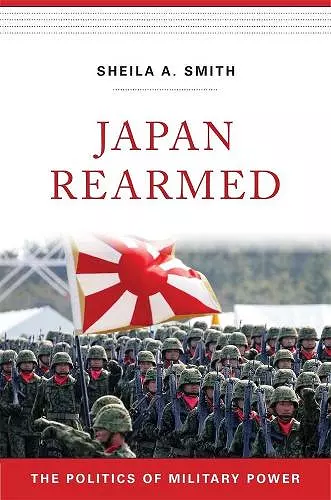Japan Rearmed
The Politics of Military Power
Format:Hardback
Publisher:Harvard University Press
Published:26th Apr '19
Should be back in stock very soon

Japan’s U.S.–imposed postwar constitution renounced the use of offensive military force, but, as Sheila Smith shows, a nuclear North Korea and an increasingly assertive China have the Japanese rethinking that commitment, and their reliance on United States security.
Japan has one of Asia’s most technologically advanced militaries and yet struggles to use its hard power as an instrument of national policy. The horrors of World War II continue to haunt policymakers in Tokyo, while China and South Korea remain wary of any military ambitions Japan may entertain. Yet a fundamental shift in East Asian geopolitics has forced Japan to rethink the commitment to pacifism it made during the U.S. occupation. It has increasingly flexed its muscles—deploying troops under UN auspices, participating in coercive sanctions, augmenting surveillance capabilities, and raising defense budgets.
Article Nine of Japan’s constitution, drafted by U.S. authorities in 1946, claims that the Japanese people “forever renounce the use of force as a means of settling international disputes.” When Prime Minister Shinzo Abe broke this taboo by advocating revision of Article Nine, public outcry was surprisingly muted. The military, once feared as a security liability, now appears to be an indispensable asset, called upon with increasing frequency and given a seat at the policymaking table.
In Japan Rearmed Sheila Smith argues that Japan is not only responding to increasing threats from North Korean missiles and Chinese maritime activities but also reevaluating its dependence on the United States. No longer convinced that they can rely on Americans to defend Japan, Tokyo’s political leaders are now confronting the possibility that they may need to prepare the nation’s military for war.
Timely and useful…Japan’s armed forces remain limited in size and in the operations that they can conduct, and have never, since 1945, engaged in combat. Nor has the country seriously debated equipping them with nuclear weapons. Now, however, North Korean and Chinese military initiatives, along with uncertain American attitudes toward the alliance with Japan, threaten to change all this. -- Michael Mandelbaum * American Interest *
Washington’s relationship with Tokyo is generally considered the most important of the United States’ 70-odd alliances. In this intimately knowledgeable book, Smith shows how that alliance looks to the Japanese: increasingly unreliable. -- Andrew J. Nathan * Foreign Affairs *
The must-read book for anyone who seeks foundational knowledge of what is arguably the most important military alliance in the world…A highly readable and richly detailed account of Japan’s rearmament and the politics surrounding it…Likely to grow even timelier as tensions in East Asia ratchet up. -- Jason Morgan * Journal of American–East Asian Relations *
A well-written and comprehensive overview of postwar Japan’s security evolution…Deserves to be read by policy makers interested in Japanese security and to be added to the syllabi of undergraduate and postgraduate programs on East Asian security and Japanese international relations. -- Giulio Pugliese * Monumenta Nipponica *
Smith masterfully traces the interplay of Japan’s military heritage, politics, national sentiment, threats, and alliance with the United States in the formation and development of the Self-Defense Force. Even experts will find new information and insights in her account. As she makes clear, the SDF is a work in progress, and this book provides a welcome guide to its possible future path. -- Admiral Dennis Blair, U.S. Navy (Ret.), former Commander-in-Chief, U.S. Pacific Command
At a time when the East Asian security environment is becoming ever more dangerous and unpredictable, Sheila Smith offers a timely guide to the choices facing Japan. This is an insightful and indispensable look at the evolution of Japan’s approach to national security and the consequential decisions it will face in the future. -- James Steinberg, Syracuse University
After fighting a series of aggressive wars in the early twentieth century, Japan retreated from power politics and has remained reluctant to develop a military capability that matches its economic power. Will this change? The paradoxical transition from militarist aggression to pacifism and isolationism has been discussed before, but never with the clarity Sheila Smith displays in this important book. She shows that Japan will have some critical choices to make to maintain its security in the challenging geopolitics of the twenty-first century. -- Kiichi Fujiwara, University of Tokyo
With keen insight and scholarly precision, Smith tells us why the Japanese public’s evolving attitude toward the use of military force is important to American security and the peace of northeast Asia. A must-read for U.S. policymakers responsible for Asia. -- J. Thomas Schieffer, former U.S. Ambassador to Japan
ISBN: 9780674987647
Dimensions: 210mm x 140mm x 25mm
Weight: 553g
352 pages